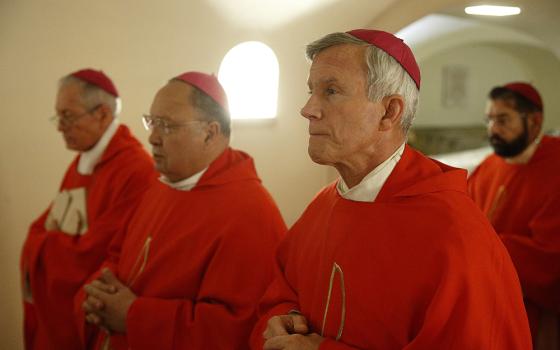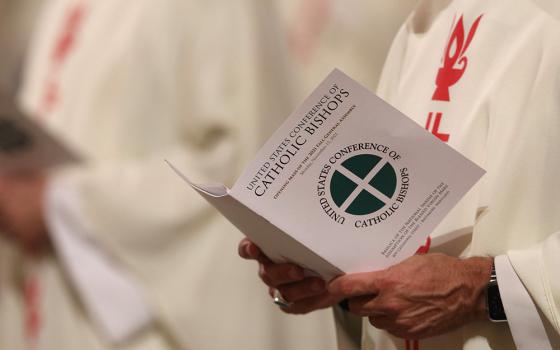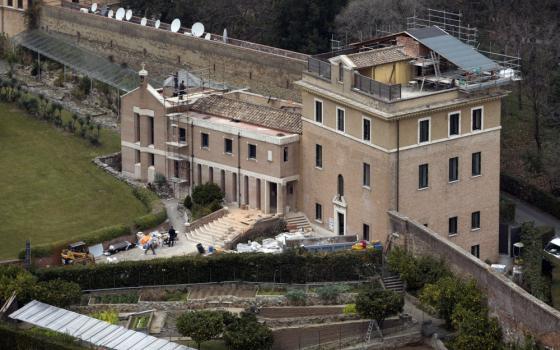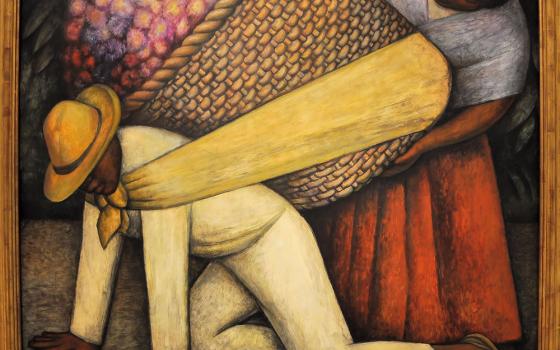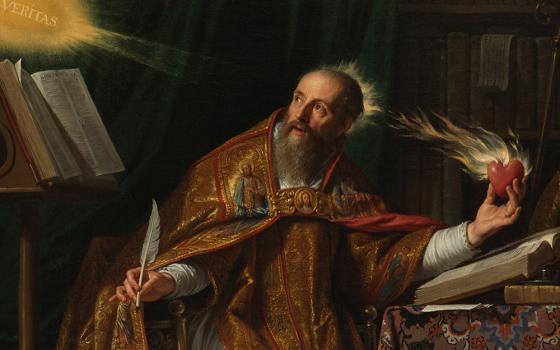
Salvadorans walk past a mural of Salvadoran martyrs Aug. 15, 2020, outside Our Lady of Pilar Catholic Church in Zaragoza, El Salvador. The mural includes St. Óscar Romero and four U.S. churchwomen slain in El Salvador in 1980. (CNS/Courtesy of Patricia Lazo)
"I have come to set the earth on fire!" Sweet holy card images aside, Jesus was no wimp! Nor could he be apolitical.
In our trip through the Gospel of Luke, we have passed a dividing line, a measure not of words or chapters, but of intensity. The new tone began with Luke 9:51, which translated literally says, "When the time came that he would be taken up, he steadfastly set his face to go to Jerusalem" (emphasis mine). Not long after Jesus first told the disciples that the mission they were sharing would entail suffering and death (Luke 9:22-23), he purposely set out to confront his fate in Jerusalem.
The Gospel of John tells us that when Jesus decided to go to Jerusalem, Thomas looked at the others and said, "Let us also go to die with him." They had no reason to think that the rest of the story would be a picnic: Jesus and everyone identified with him were headed toward inevitable conflict with religious and civil authorities.
By this stage, Jesus knew full well that his message threatened powerful people. He also knew that Scripture and tradition testified that prophets never fare well with anyone whose plans and schemes do not prioritize the common good.
Although Jesus' community turned primarily to the prophet Isaiah to help them interpret Jesus, all the prophets were his forerunners and their lives provided a good foretaste of what he would experience as God's messenger.
Today we hear about Jeremiah, the best complainer among the prophets of Israel. (Jonah did his share of whining, but his story is more of a comic caricature than serious prophecy.) As we meet Jeremiah today, he has been dealing with a king who wanted to know God's will, but lacked the courage to obey it. Jeremiah knows and tells his people that they are in an unwinnable war.
For saying that, the military leaders decide to get rid of him; his truth-telling is demoralizing and they prefer affirmation to reality.
What we hear today is but one of many times Jeremiah was persecuted or nearly killed for the message he preached.
What gives prophetic people the determination to defy mortal threats? The memory of some of the "cloud of witnesses" mentioned in the Letter to the Hebrews may give us a hint.
Remember Joan of Arc? Following the instructions of the voices she heard, she saved the reign of King Charles VII of France, but ended up burned at the stake on multiple charges, including heresy (holding fast to her experience of faith rather than obeying church authorities), witchcraft (knowing the secrets of hearts and predicting the outcome of battles) and dressing like a man. The real reason for her death was surely the jealousy of religious and military leaders who lost their cause to the troops she commanded.
Although some of his fellow bishops, clergy and people criticized him, St. Óscar Romero's death came at the command of political leaders who found his defense of the poor and the truth a mortal danger to their rule.
Advertisement
Ita Ford, Maura Clarke, Jean Donovan, and Dorothy Kazel, the 1980 U.S. martyrs in El Salvador, risked and lost their lives simply because of their commitment to share life and faith with the poor.
The Rev. Martin Luther King Jr.'s preaching about equality and justice brought him multiple threats before an assassin's bullet silenced him.
More recently, two Mexican Jesuits who had long before thrown their lot in with the poor were murdered for harboring a man seeking asylum protection from supposed members of a drug mafia.
Every one of these people was motivated by what Hebrews calls "the joy that lay before them," their conviction that living the values of the reign of God is worth any cost. Their motivation and conviction were religious, but as religious people acting for the common good, they were inevitably involved in the political as well. As St. James tells us, faith without works is a sham.
When we ask what these readings say to us today, we might take Jesus' opening line in combination with a phrase from the Letter to the Hebrews. Jesus said, "I have come to set the earth on fire." Hebrews explains that the cloud of witnesses ran the race with their eyes fixed on Jesus who endured everything "for the sake of the joy that lay before him."
It seems that the joy of an earth on fire with the love of God, an earth on fire with God's justice, was the vision that drew Jesus forth.
Inviting us to seek inspiration from the cloud of witnesses fired with a joyful vision of God's reign on earth, today's liturgy reminds us that faith demands action for the common good — no matter the risk.

